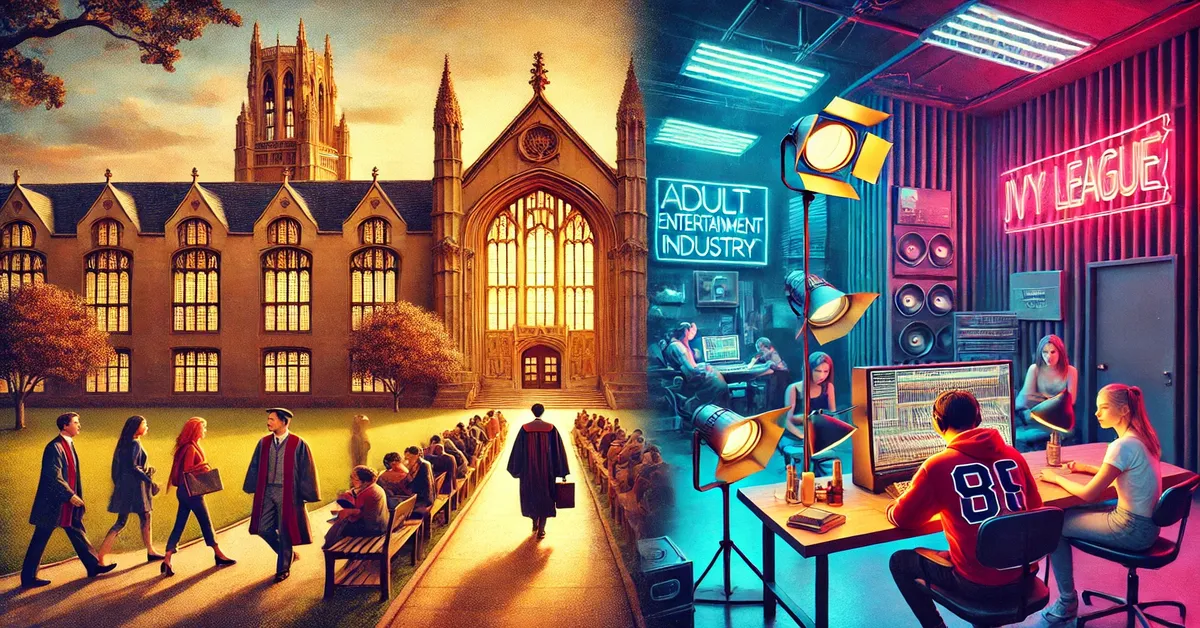The journey from attending prestigious Ivy League schools to graduating from platforms like Excogi, which features adult content, represents a unique from ivy league to excogi grad and thought-provoking trajectory that stirs curiosity and opens a dialogue on societal expectations, personal choices, and the shifting dynamics of professional success. This article takes a deep dive into this topic, exploring the factors that lead individuals from elite educational backgrounds to participate in unconventional industries. We will examine the from ivy league to excogi grad broader cultural and societal influences that might shape these decisions, as well as the challenges and opportunities that arise along the way.
A Brief Overview of the Ivy League
The Ivy League is a group of eight private universities in the Northeastern United States, known for their academic excellence, rich history, and highly selective admissions process. These institutions—Harvard, Yale, Princeton, Columbia, Brown, Dartmouth, Cornell, and the University of Pennsylvania—are often seen as pinnacles of higher education. They attract some of the from ivy league to excogi grad brightest minds from around the world and are known for producing leaders in various fields, including law, business, politics, and science.
An Ivy League education is often associated with a promise of success, stability, and social prestige. Graduates from these institutions typically go on to prestigious careers in traditional fields such as finance, academia, medicine, and law. The pressure to conform to these norms can be intense, as the expectation to maintain the from ivy league to excogi grad status quo looms large over many Ivy League students and alumni.
Excogi and Adult Entertainment Platforms
Excogi is a platform that features adult content, often with an amateur focus, in a stark contrast to the polished and corporate world often associated with Ivy League graduates. The adult entertainment industry, of which Excogi is a part, is a multi-billion-dollar business. Although controversial and frequently stigmatized, it provides income and autonomy for many individuals who choose to work in it.
The adult entertainment industry has also evolved significantly with the rise of digital platforms. The democratization of content creation, especially in the internet age, has allowed many performers to exercise greater control over their careers and financial futures. While from ivy league to excogi grad this industry continues to face from ivy league to excogi grad societal stigmas, it has undeniably provided a path to financial independence for many who choose to work within it.
Understanding the Motivations
Why would someone who has invested years of effort into securing an Ivy League education choose to venture into the adult entertainment world? The answer is neither simple nor universal. Below are some potential motivations for this drastic career shift:
1. Financial Considerations
Despite the prestige associated with Ivy League institutions, student loans and financial debt are a reality for many graduates. The cost from ivy league to excogi grad of tuition, coupled with living expenses in cities like New York, Boston, or Philadelphia, can lead to significant financial strain. Even with high-paying job offers in traditional fields, graduates may find themselves weighed down by the pressure of repaying their education. Adult content platforms like Excogi can offer quick financial returns, from ivy league to excogi grad sometimes surpassing the starting salaries in entry-level professional positions.
Additionally, with the rise of subscription-based platforms and direct-to-fan models, individuals in the adult industry can often exercise control over their income streams in ways that traditional career paths might not afford.
2. Autonomy and Personal Agency
The conventional career paths expected of Ivy League graduates—investment banking, consulting, medicine, or law—can often be associated with high stress and long working hours. For some individuals, the rigid structures and corporate hierarchies can feel limiting.
In contrast, the adult entertainment industry, despite its stigmas, offers a level of personal autonomy and control over one’s work. Performers often decide their hours, negotiate pay, and have more direct control over the content they produce. This sense of agency can be appealing, particularly for those who feel constrained by the demands and expectations of their Ivy League backgrounds.
3. Challenging Societal Norms
The decision to move from an Ivy League education to working in adult entertainment could also be an act of rebellion against societal norms. Individuals from from ivy league to excogi grad elite institutions are often expected to conform to certain professional standards and uphold specific moral codes. By entering a field that is traditionally stigmatized, some may feel they are pushing back against these societal pressures, asserting their right to define their success and happiness on their own terms.
This choice could be seen as a form of self-empowerment, challenging the notion that success can only be achieved through conventional, “respectable” means. It also raises broader questions about the societal values attached to certain professions and how these values shape the perception of success.
4. A Search for Identity
For some, the Ivy League experience may not have lived up to the promise of personal fulfillment. The competitive atmosphere, pressure to achieve, and the often elitist culture can leave graduates feeling disillusioned or disconnected from their from ivy league to excogi grad true passions.
In this context, entering the adult entertainment industry might represent an opportunity for self-discovery or experimentation with different facets of one’s identity. It offers a departure from the rigid expectations of Ivy League graduates, allowing individuals to explore parts of their personalities and desires that may have been suppressed or ignored during their academic journeys.
The Role of the Internet and Digital Platforms
The internet has played a pivotal role in enabling and normalizing alternative career paths, including adult entertainment. Digital platforms have created spaces where individuals can produce, distribute, and monetize their content independently, bypassing traditional gatekeepers. Platforms like Excogi cater to a wide range of preferences and niches, allowing performers to find specific audiences and build loyal followings.
This shift has led to the democratization of adult content, as performers can now control their image, content, and fan engagement more directly. In contrast to the traditional, male-dominated adult entertainment industry, digital platforms empower from ivy league to excogi grad individuals—particularly women—to negotiate their terms and maintain autonomy over their brand.
The Public Perception and Stigma
While the motivations for making this transition may vary, public perception remains a significant challenge for those who move from Ivy League backgrounds to careers in adult entertainment. Even though society has become more open to discussions around sexuality, the stigma attached to adult work remains pervasive. The social repercussions of entering this industry can be severe, ranging from strained relationships with family and friends to limited job opportunities in other sectors.
Furthermore, individuals who enter the adult entertainment industry from prestigious academic institutions face additional scrutiny. For many, the decision may be viewed as a waste of their education or a betrayal of the elite values they were supposed from ivy league to excogi grad to uphold. The contrast between the intellectual rigor of an Ivy League education and the perceived moral laxity of the adult entertainment industry can create a complex web of judgments and assumptions.
Navigating the Consequences
One of the most significant challenges that individuals in this position may face is the long-term impact on their personal and professional lives. While adult entertainment can offer short-term financial gains and personal freedom, the industry is still fraught with risks. Performers often face online harassment, public exposure, and the potential for future discrimination when attempting to transition back into more traditional career paths.
For those with Ivy League degrees, the question arises: Will their educational background shield them from some of the harsher consequences of working in adult entertainment? Or will the stigma follow them regardless of their elite credentials? The answer is not straightforward and depends on various factors, including public perception, the nature of the from ivy league to excogi grad content they produce, and their ability to navigate these challenges with resilience and adaptability.
The Intersection of Feminism and Adult Entertainment
A crucial aspect of this conversation is the role of feminism in discussions about adult entertainment. For some, working in the adult industry is seen as a form of feminist empowerment, where women control their bodies and their financial futures. They argue that by reclaiming their sexuality and profiting from it on their terms, they are subverting patriarchal structures that have traditionally commodified female bodies.
However, this viewpoint is not without its critics. Others argue that the adult industry, regardless of the level of autonomy individuals might have, perpetuates harmful stereotypes and objectifies women. The debate between empowerment and exploitation is ongoing and remains a central point of contention when discussing the adult entertainment industry in from ivy league to excogi grad a feminist context.
Broader Implications for Society
The journey from Ivy League to Excogi graduate raises important questions about the evolving nature of work, identity, and success. As traditional career paths become less rigid and alternative professions gain prominence, societal definitions of success are also shifting. What once might have been seen as a “fall from grace” might now be viewed as a legitimate personal and financial decision.
The story of Ivy League graduates entering the adult entertainment industry highlights the complexities of human choice and the multiplicity of factors that shape our professional journeys. It challenges us to consider what success really means and whether societal from ivy league to excogi grad expectations should dictate the direction of our lives.
Conclusion
The transition from Ivy League graduate to Excogi performer is not a story of failure or deviation but rather one of personal agency, financial necessity, and the quest for autonomy in an increasingly complex world. It represents a break from traditional notions of success, prompting society to reconsider its values and the weight it places on certain professions from ivy league to excogi grad over others. In an age of digital empowerment and evolving career paths, this story is a testament to the changing landscape of work, identity, and self-expression.
FAQs:
1. What motivates someone to shift from an Ivy League background to adult entertainment? Motivations vary but often include financial considerations, the desire for personal autonomy, and the search for identity outside traditional from ivy league to excogi grad career paths.
2. Is it common for Ivy League graduates to enter the adult entertainment industry? While it is not common, cases exist, and such decisions tend to attract significant media attention due to the stark contrast between the two fields.
3. Does an Ivy League degree offer protection from the stigma associated with adult entertainment? Not necessarily. While an Ivy League degree may provide credibility in some circles, societal stigma around adult work often remains.
4. How has the internet changed the adult entertainment industry? The internet has democratized adult content creation, giving performers
more control over their careers, content, from ivy league to excogi grad and income streams through platforms like Excogi.
5. Can someone transition back to a traditional career after working in adult entertainment? While possible, transitioning back can be challenging due to societal stigmas and potential discrimination from employers.
6. Is working in adult entertainment considered empowering? Views differ. Some see it as a form of feminist empowerment and autonomy, while others believe it perpetuates objectification and exploitation.











